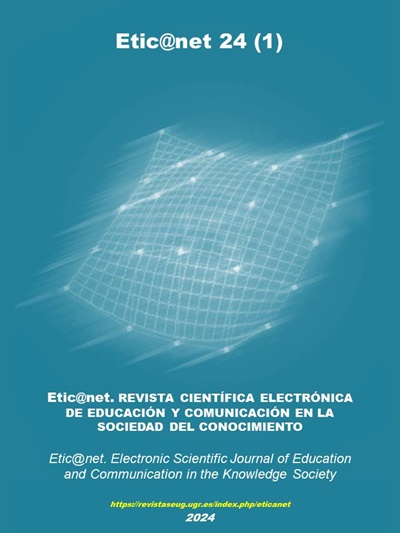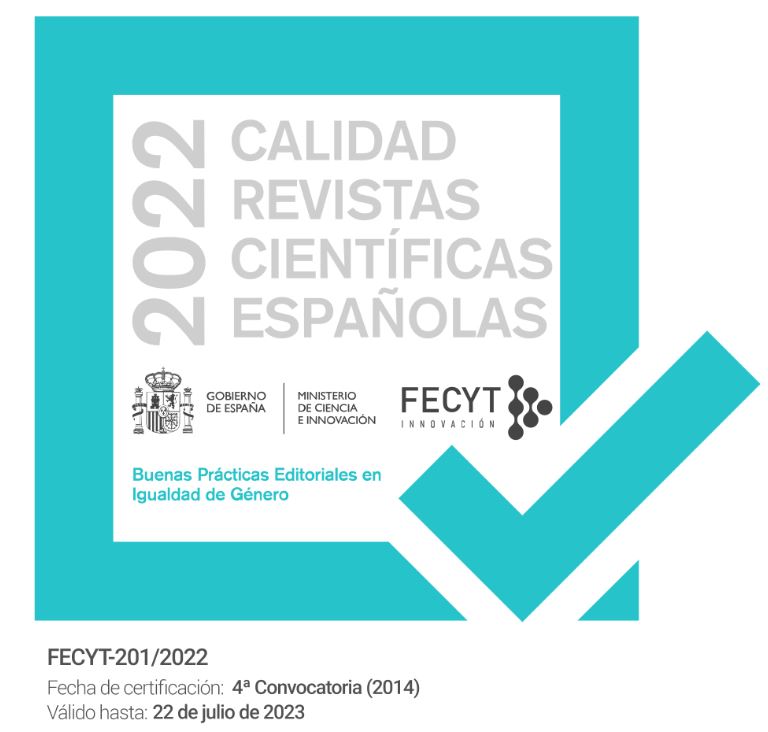The new school model, and its influence on aspects of inclusion in elementary school students of an educational institution in the municipality of Acandí - Chocó
DOI:
https://doi.org/10.30827/eticanet.v24i1.29177Keywords:
Educational inclusion, students with disabilities, diversity, teaching-learning process, New School Model, professional teacher training, strategies for changeAbstract
The educational inclusion of students with disabilities is a topic of great social and academic relevance, which implies the recognition and valuation of diversity as an enriching element of the teaching-learning process. This article analyzes the new school model and its influence on aspects of inclusion in elementary school students of an educational institution in the municipality of Acandí - Chocó. For which a qualitative methodology with phenomenological approach is implemented, which allows to deepen and understand the part of the institutional reality that takes into account students with disabilities and the educational community. Highlighting aspects derived from the professional teacher training, vocational aspects and the difficulty in accessing didactic resources that facilitate the processes of educational inclusion in the analyzed educational institution. And establishes the articulation of strategies for change that allow the participation of various local and national institutions, the educational community, including teachers, students, parents, and community leaders. In the identification of the E.I.'s needs, strengths and opportunities in aspects of educational inclusion.
Downloads
References
Anzola Jiménez, J. F., & Rey Olivos, P. A. (2022). Análisis de política pública: participación ciudadana de las personas con discapacidad durante el gobierno de Enrique Peñalosa (2016-2019). [PDF] lasalle.edu.co
De Caserta, B. R. (2015). La diversidad funcional desde la escuela regular y su impacto social. Dudas@ lia: didáctica y educación ISSN 2224-2643, 6(3), 207-216 [PDF] ult.edu.cu
Escudero Sánchez, C. L. y Cortez Suárez, L. A. (2018). Técnicas y métodos cualitativos para la investigación científica. Editorial UTMACH. http://repositorio.utmachala.edu.ec/handle/48000/12501
Gelabert, M. À. E. (2006). Liderar escuelas interculturales e inclusivas: equipos directivos y profesorado ante la diversidad cultural y la inmigración (Vol. 222). Graó.
Güiza Santamaría, O. C. (2017). Etnoeducación Y Formación De La Identidad En Estudiantes De La Escuela De Policía “Miguel Antonio Caicedo Mena” De YUTO CHOCÓ, 2015. [PDF] uwiener.edu.pe
Hernández, R., Fernández, C. y Baptista, M. (2014). Metodología de la investigación. McGraw-Hill. https://www.uca.ac.cr/wp-content/uploads/2017/10/lnvestigacion.pdf
Hurtado Mosquera, M. M. (2019). El fortalecimiento de las identidades étnicas y de género en adolescentes afrocolombianas de la Institución Educativa Los Andes del municipio de Chigorodó. [PDF] udea.edu.co
Lázaro Guillermo, J., Del Águila, A., Avilés Sandi, J., Guerra Ríos, A., Auris Palomino, M. & Yon Delgado, J. (2022). Educación inclusiva en Latinoamérica: Enfoque intercultural. Editorial Mar Caribe de Josefrank Pernalete Lugo, Vol. 1(1), 1 - 136. Doctoral dissertation. [PDF] osf.io
Martínez Usarralde, M. J. (2021). Inclusión educativa comparada en UNESCO y OCDE desde la cartografía social. Educación XXI: Revista de la Facultad de Educación. [PDF] educacion.gob.es
Montoya Rueda, H., Ocampo Carmona, N. E., & Rivera Duque, M. (2022). Políticas de inclusión y aprendizaje en entorno de escuela nueva (Doctoral dissertation, Corporación Universitaria Minuto de Dios-UNIMINUTO). [PDF] scimago.es
Navarro, N. (2020). Docencia inclusiva en formaciones técnicas: diseño universal y accesibilidad universal; comunicación al Taller 7. [PDF] ceu.es
Orozco, H. (2021). Un marco orientador para asegurar la protección integral y continuidad del aprendizaje de calidad de niñas, niños y jóvenes en contextos de emergencia. Miscelánea Comillas. Revista de Ciencias Humanas y Sociales, 79(154), 355-383. [PDF] comillas.edu
Pérez Dávila, F. L. (2018). Políticas educativas en Colombia: en busca de la calidad. Actualidades pedagógicas, 1(71), 193-213. https://ciencia.lasalle.edu.co/cgi/viewcontent.cgi?article=1344&context=ap
Prada, E., & Garzón, E. (2020). Participación de las personas con discapacidad intelectual en el diálogo de actores para la construcción de política pública de discapacidad en el municipio de Apartadó Antioquia. [PDF] udea.edu.co
Taylor, S. J., & Bogdan, R. (2008). La entrevista en profundidad. Métodos cuantitativos aplicados, 2, 194-216. [PDF] academia.edu
Downloads
Published
Issue
Section
License
The authors who publish in this journal agree to the following terms: The authors retain the copyright and grant the journal the right to be the first publication of the work as well as licensed under a Creative Commons Attribution License that allows others to share the work with an acknowledgment of the authorship of the work and the initial publication in this magazine. Authors are allowed and encouraged to disseminate their work electronically (for example, in institutional repositories or on their own website) before and during the submission process, as it may lead to productive exchanges as well as further citation. Earliest and greatest of published works (See The Effect of Open Access).













